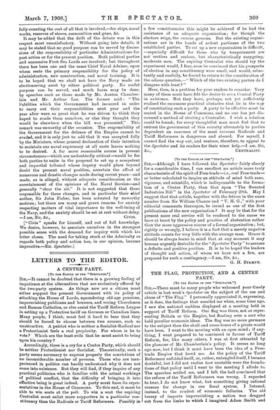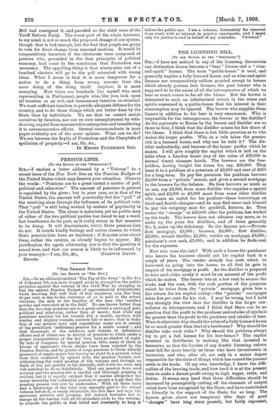THE FLAG, PROTECTION, AND A CENTRE PARTY.
ITO THE EDITOR OP THE " SPECTATOR."]
SIR,—There must be many people who welcomed your timely article in last week's Spectator on the subject of the use and abuse of " The Flag." I personally appreciated it, expressing, as it does, the feelings that assailed me when, some time ago. I saw the national emblem displayed at a meeting held in support of Tariff Reform. Our flag was there, not as repre- senting Britain or the Empire, but floating over a sect who hold peculiar economic ideas. The flag was no more germane to the subject than the skull and cross-bones of a pirate would have been. I went to the meeting with an open mind ; if any- thing, I went prepared to be convinced in favour of Tariff Reform, for, like many others, I was at first attracted by the glamour of Mr. Chamberlain's policy. It seems so long ago now, but I think it must have been the idea of a Free- trade Empire that lured me. As the policy of the Tariff Reformers unfolded itself, or, rather, entangled itself, I became doubtful, but I did not realise how unstable were the founda- tions of that policy until I went to the meeting I allude to. The speeches settled me, and I left the hall convinced that the reform of the Tariff Reformers was wrong. I expected to bear, I do not know what, but something giving rational reasons for change in our fiscal system. I listened, instead, to the crudest of economic fallacies. The old heresy of imports impoverishing a nation was dragged out from the limbo to which I imagined Adam Smith and
Mill had consigned it, and paraded as the chief ware of the Tariff Reform Party. The worst part of the whole business, to my mind, is not so much the proposed change of our system, though that is bad enough, but the fact that people are going to vote for fiscal change from unsound motives. It would be comparatively harmless if the electorate were composed of persons who, grounded in the first principles of political economy, had come to the conclusion that Protection was necessary. The appalling thing is that ninety-nine out, of a hundred electors will go to the poll saturated with wrong ideas. What I mean is that it is more dangerous for a nation to do a thing from wrong reasons than the mere doing of the thing itself. Anyhow, it is more annoying. Now there are hundreds like myself who need representing in Parliament, people who, like you, look upon all taxation as an evil, and unnecessary taxation as criminal. We want sufficient taxation to provide adequate defence for the country, and to do those things which are better done by the State than by individuals. We see that we cannot enrich ourselves by taxation, nor can we cure unemployment by with- drawing capital from remunerative enterprises and transferring it to unremunerative efforts. Several correspondents in your paper evidently are of the same opinion. What can we do ? We are between the Scylla of Protection and the Charybdis of spoliation of property.—I am, Sir, &c.,
IN MEDIIS TIITISSIMUS IBIS.















































 Previous page
Previous page